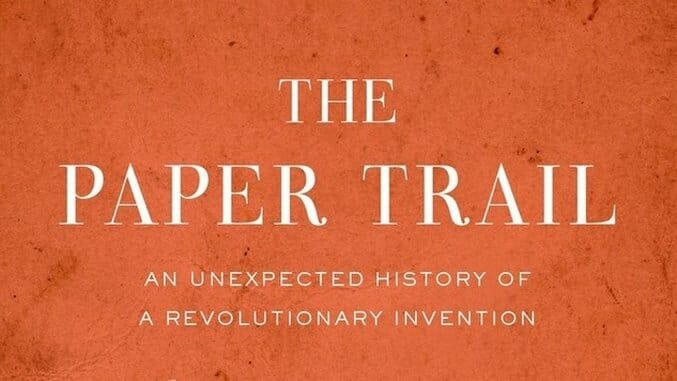Alexander Monro Documents a Revolutionary Invention’s Historical Impact in The Paper Trail
Author Photo by Hannah van Dijk
Few of us give thought to paper’s impact on our lives. From printouts to books to household goods, paper has become an omnipresent yet nearly invisible part of life. But in his new book The Paper Trail, Alexander Monro explores the storied history of the humble piece of paper, illustrating how civilization has been pushed forward in remarkable ways by this simple, ancient invention.
Beginning in China almost 2,000 years ago, paper was a durable and cheap alternative to expensive shells and bamboo. Over the course of human history, paper made its way around the world, playing a pivotal role in history’s most significant cultural shifts. Providing widespread access to ideas and allowing easy communication, paper has been the bedrock of mankind’s culture, religious and political evolution.
But does paper have a future in today’s world? Here, Monro shares his thoughts on the material’s lasting impact and its important role in an increasingly digital society.
![]()
 Paste: How did you decide to tell the story of paper?
Paste: How did you decide to tell the story of paper?
Alexander Monro: Several years ago, I won an award to travel across Mongolia and Central Asia, following in the footsteps of the Mongols and Genghis Khan. [While writing about the trip,] I came across the story of paper. When the Mongols were unified under Genghis Khan, they didn’t have a script, so they didn’t have writing. When they conquered their way westwards across Asia, they discovered the usefulness of writing, so they asked these Uighur scribes in what is now northwest China to create a script for them. They wrote down their founding myths, the secret history of the Mongols, but also used it to administer what would become the biggest empire the world had ever seen. And so writing became enormously important for their own identity and their empire.
So I began to see the immense power that writing had, but it wasn’t writing on paper. That has enabled a far more comprehensive use of writing than would have been the case on other surfaces. I began to track back and follow the story of paper across China and back to its origins, and I became intrigued by how paper had remained marooned in east Asia for so long. Then I followed the story back the other direction, through central Asia to the Islamic Caliphate and into Europe as well. Suddenly, there was this extraordinary story right across Eurasia that dipped into different periods of history and difference civilizations, and yet it provided a unity where you could see certain themes in common.
Paste: What was the process of researching the history of paper? The book covers many subjects: religion, culture, politics. Can you tell me a bit about how you went about tackling that?
Monro: I started with China. I began with histories of ancient China and with histories of paper and papermaking in China. China has had writing for longer than any other civilization in the world and was using it long before paper was invented. So writing was already very important in China 3,000 years ago, and paper didn’t take off in China in a really big way until 1,700 or 1,800 years ago. They were using bamboo to write on, so immediately there was a need to distinguish what change paper had brought. What obvious change could you see in Chinese culture as a result of paper? They already had the Confucian classics, they already administered politics by writing.
The big shift that came was Buddhism. The arrival of Buddhism allied itself with paper, and did so enormously effectively. I think what happened was, whereas bamboo had been for the elite and politicians, Buddhism on paper had been aimed at all segments of society, including women, who usually were not given access to texts in China. Even the illiterate would buy little charms with Buddhist scripture. These things were much more affordable because they were on paper. It enabled a much more populist religion, a much more accessible form of knowledge, and it enabled that because it was a much cheaper surface.
Paste: The book is sprawling, but the biggest takeaway I had was that paper was one of the most pivotal inventions in history. What role has paper had in pushing culture, politics and civilization forward?
-

-

-

-

- Curated Home Page Articles By Test Admin October 21, 2025 | 3:10pm
-

- Curated Home Page Articles By Test Admin October 21, 2025 | 2:57pm
- Urls By Test Admin October 21, 2025 | 2:57pm
- Curated Home Page Articles By Test Admin October 21, 2025 | 2:55pm
-

-

-

-

-

-

-

-

-

-

-

-

-

-

-

-

-

-

-

-

-

-

-

-

-

-

-

-

-

-

-




































